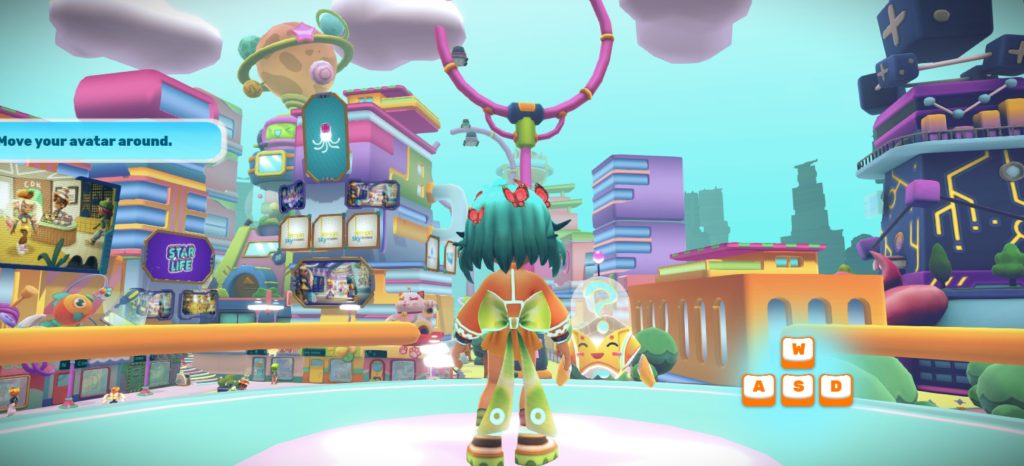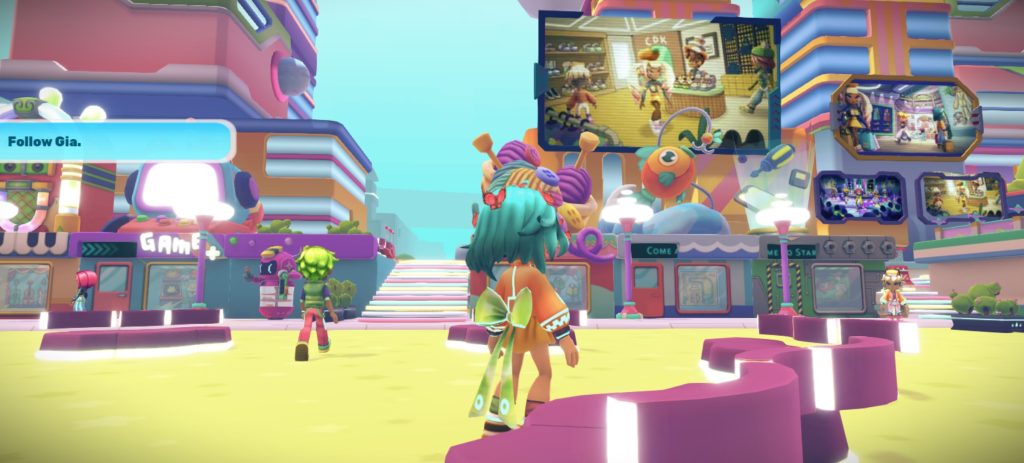
Flying Sheep was founded by German friends in 2014, with a specific goal of making html5 browser games. Initially, the company struggled to compete in a hyper-competitive global market, and in a development sector that lacks sophisticated off the shelf game engines. But the team persevered, taking on work-for-hire, and building its own engine that could handle the kind of 3D browser games the company wanted to build for high profile brands like Lego and Dreamworks.
Now owned by Australian company iCandy, Flying Sheep has turned towards a Web3 model for its next project, Star Life. Browser games – that do not have to deal with console authentication, PC retail portal approval, or mobile platform fees – are currently a favored destination for nascent Web3 games that seek to make use of NFTs and blockchain transactions
Flying Sheep managing director Thomas Rössig wrote a master’s thesis in 2009 about ‘Motivations to purchase virtual items in social browser games’, so in-game monetization has been a long-standing fascination. “While our games were web2 focused, we had been following the development of the NFT market,” says Rössig, who also serves as iCandy’s head of Europe. “I’m personally very interested in the idea of digital items, as I started my career in F2P monetization and in-game shop management.”
Flying Sheep was acquired by iCandy June 2022. The iCandy group also owns mobile studios Appxplore and Joyseed Gametribe as well as art and animation production house Lemon Sky, Html5 publisher Storms (which handles web distribution for games like Fruit Ninja and Jetpack Joyride) and Hashcode, which specializes in blockchain law and practice.

GameDaily asked Rössig about Flying Sheep’s early work with iCandy, and its next project Star Life.
Rössig: Early on with iCandy, we started talking about the potential of our tech to create a metaverse game. When we were looking at the Web3 games landscape it was very disappointing. You could clearly see that most of these ‘games’ were not being developed by teams that were experienced in that field. They mostly felt like decentralized finance apps with a thin layer of gamification.
We felt like they were not even scratching the surface of the potential that blockchain tech brought to the games industry. The UX of everything to do with blockchain is still in a state where onboarding new players is very challenging.”
GameDaily: Your company slogan is that you “craft truly frictionless games for the metaverse”. Tell us about the challenge of onboarding new players into Web3 games?
Rössig: We see the metaverse as the convergence of virtual worlds, virtual social environments and persistent virtual identities. As social networks continue to evolve, a lot of our social life is shifting online. People are spending more and more time in online worlds, as they are so immersive and offer so much freedom we often don’t have in our physical lives.
We believe for a Metaverse to exist, anyone should be able to access it anywhere, anytime, as easily as one click. So that is what we are designing the game around – high accessibility covering as many aspects of the term as possible.
Star Life will allow players to access the Metaverse with just one click on any browser, with no downloads or installations required. It will be free-to-play, so everyone can play without ever having to spend a single cent. The gameplay is designed so that people can easily pick it up and we will make inclusivity a priority, so that everyone feels welcome. All blockchain aspects are totally optional.
GameDaily: Star Life’s first alpha is scheduled for later this year. What kind of game is it?
Rössig: Star Life takes place within an open, persistent, massively multiplayer city, with a focus on meaningful social interactions and self-expression. The gameplay will be more on the casual side, very cooperative with no violence whatsoever, and no twitch-reactions necessary.
Within the city, we will offer real-estate where players, companies and brands can create their own experiences. These can be shops, community centers, event locations, etc… For this, we will provide no-code tools. Promotion of these experiences will also be made very easy, as the owner will get a direct link, which enables anyone to join and enter that specific experience with one click.
Imagine if you organize a virtual concert in Star Life that starts in a few minutes. You share a tweet with the direct link, and anyone that sees the link can click, and instantly join the concert. If they are registered, they appear as their avatar with their current outfit, which can easily switch to whatever they feel is appropriate to that concert. If it’s their first time in Star Life, or they just never registered, they get to enjoy the concert anyway, but with a blank avatar and no communication possibilities.
Now I was talking about outfits just before, which is where blockchain and NFTs come in. Most items in the game will be ‘normal’ server-based items. Players can play for years and never have to interact with the blockchain. However for players that want to, we will give the option to mint their item into an NFT to unlock stronger ownership and agency over their virtual belongings. Having stronger ownership and agency over their virtual belongings will grant tradeability, inscribed item history and interoperability.
Our items can be taken into other games. What we also find very interesting is that existing NFT series can find a home in Star Life, with its own experience, and every NFT holder receives a counterpart when joining the game.
The idea is that, similar to free-to-play games, the game has to support the possibility that over 90% of players never pay or interact with the blockchain.
GameDaily: Tell us about your success in raising $1.2 million in funding from the German Federal Ministry for Economic Affairs and Climate Action?
Rössig: Raising money from the German Government was at the same time straightforward and challenging. Straightforward because there is actually a 50-70 million Euros fund dedicated to supporting the German games industry. It can pay up to 50% of the game development costs incurred in Germany.
The challenging part was that a metaverse game didn’t really fit well in the mold of what the German institutions feel a game is. So it took over six months and a lot of back-and-forth communication to arrive at a point where we were greenlit to receive the funds as the first metaverse and blockchain-enabled game to go through that program.
Now that being said, we are actually very lucky with the German public funding landscape. There is a mix of local prototype, and federal funding for more ambitious productions, which have leveled the playing field for German game development studios. The existence of this fund definitely helped fuel Flying Sheep Studios’ commitment to continue developing our expertise and put Germany on the map when it comes to the gaming industry.
GameDaily: What advice would you give to game companies looking to raise funding through government funding?
Rössig: While such funding is attractive, from our experience there are three important things to consider before applying for government funds:
First, it will take longer than expected. While the chances of being funded are high, you have to be patient and prepare a financial plan where you will probably only receive the funds several months in the future.
Second, you have to contribute your part of the funding, at least 50% of the project (in Germany’s case).
Third, It requires significant administrative efforts, as not only do you have to prepare a detailed plan on why you need the funds and how you will deploy it, but you also have to report progress during the project, as well as justify and document all expenditures at the end.
GameDaily: How do you feel about the general cooling in expectation that we are currently seeing around metaverse gaming?
Rössig: Yes, we see a cooling of the expectations around web3 and metaverse, which to be honest doesn’t really worry us at iCandy. There were two problems with web3 gaming until now.
First of all, from the point of view of a lifelong game developer, the communications coming from the Web3 space was sub-optimal. It was all about absolutist claims like ‘all games will use blockchain in the future’. If a game developer hears this, their only reaction can be ‘that’s bollocks’. Different game genres need different business models, and I believe that blockchain will be an interesting and lucrative addition to free-to-play models, as well as create totally new ones, but it won’t replace all others.
Same with the statement ‘soon we can take any item from any game into any other game’. As funny as it would be to take a Counter Strike AK47 into Animal Crossing, that doesn’t make sense from a game design, tech and commercial perspective. But there are many cases where interoperability can add a lot of benefits to the players.
So what really lacked in Web3 communication was nuance, which led to a lot of toxicity from both sides.
Another problem is that building games is really, really hard, and takes a lot of time, especially when you want to add a new monetization method to the mix. So we simply haven’t had the time to see great games emerge yet.
I have met with many Web3 game developers building amazing games so I am very confident that within the next two years, we will see games that will bring blockchain into the gaming mainstream. Western hardcore gamer audiences were also extremely negative towards microtransactions until League of Legends popularized it. We need the LoL of blockchain gaming.
To be honest, I actually appreciate that a lot of the conversation has shifted away from blockchain and more towards AI, so that we can sit down and build an amazing web3 game in peace, and prove to the world that you can use blockchain to improve some players’ experience, without harming other players.
You can find out more about Flying Sheep here.
Colin Campbell has been reporting on the gaming industry for more than three decades, including for Polygon, IGN, The Guardian, Next Generation, and The Economist.
 GameDaily.biz © 2026 | All Rights Reserved.
GameDaily.biz © 2026 | All Rights Reserved.